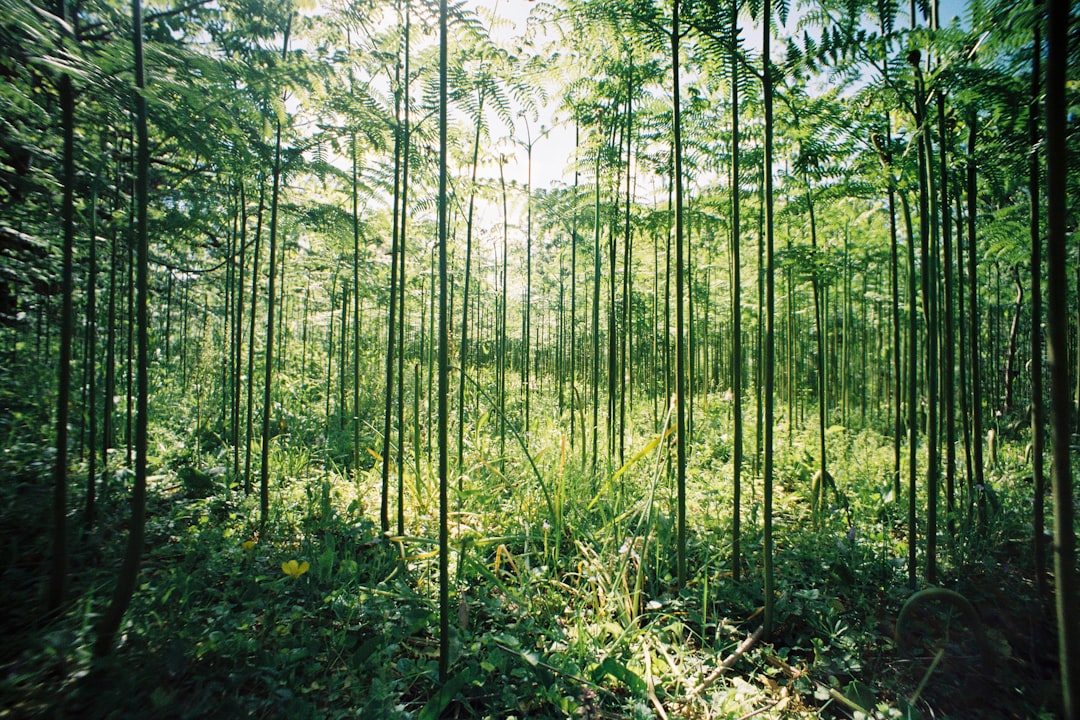Bamboo: Nature’s Sustainable Superhero

Bamboo is a remarkable renewable resource that holds great potential in combating deforestation. Unlike traditional hardwood trees that take decades to mature, bamboo can be harvested in just one to five years, making it a sustainable alternative for wood-based products. Moreover, virtually every part of the bamboo plant is, from its sturdy stalks to its delicate leaves, minimizing waste and showcasing its versatility in various industries such as furniture, paper production, and construction materials. Additionally, bamboo exhibits resilience by thriving in diverse conditions, including arid regions, where it helps preserve soil moisture and prevent desertification.
To illustrate, imagine a bamboo forest where every stem harvested is utilized to create a range of products, from durable flooring to biodegradable utensils. This efficient use of resources not only minimizes waste but also reduces the pressure on traditional forests for raw materials, thus playing a significant role in environmental conservation efforts.
The Rapid Growth of Bamboo
One of the most impressive features of bamboo is its rapid growth rate, which enables quick replenishment and utilization. Some bamboo species have been known to grow over three feet in a single day, earning bamboo the title of the fastest-growing plant on Earth. This rapid growth not only allows for continuous harvesting but also positions bamboo as a sustainable resource for various industries, ranging from construction to textile production. Moreover, the quick growth cycle of bamboo contributes to its eco-friendly nature, making it an attractive option for environmentally conscious consumers and businesses.
For instance, picture a bamboo plantation where new shoots emerge and grow visibly every day, providing a sustainable and rapidly renewable source of raw material for industries. This quick turnover not only supports the demand for bamboo-based products but also underscores the plant’s ability to adapt and thrive in changing environmental conditions.
Eco-Friendly Properties of Bamboo
Bamboo boasts a range of eco-friendly properties that make it a standout sustainable material. Unlike conventional crops that rely heavily on pesticides and fertilizers, bamboo grows organically and requires minimal chemical intervention to thrive. This natural cultivation method not only promotes soil health but also contributes to overall environmental sustainability. Additionally, bamboo plays a crucial role in preventing soil erosion by retaining nutrients and moisture in the ground, further enhancing its eco-credentials. By choosing bamboo products, consumers actively support the preservation of soil quality and contribute to environmental conservation efforts.
Envision a bamboo grove where lush green stalks sway gently in the breeze, their roots firmly anchoring the soil and preventing erosion. This natural mechanism not only safeguards the land but also underscores bamboo’s ability to promote soil health and sustainability.
Bamboo’s Role in Carbon Sequestration
Bamboo’s ability to sequester carbon effectively is a key asset in combating climate change and promoting environmental sustainability. By absorbing greenhouse gases and releasing more oxygen than hardwood trees, bamboo aids in reducing carbon emissions and mitigating the effects of global warming. The substitution of hardwoods with bamboo further supports carbon sequestration efforts, contributing to sustainable resource management and environmental conservation.
Visualize a bamboo forest actively absorbing carbon dioxide from the atmosphere, while simultaneously releasing oxygen and playing a vital role in maintaining ecological balance. This carbon sequestration process highlights bamboo’s significant contribution to mitigating climate change and fostering a greener planet.
Economic Opportunities and Livelihood Applications
Bamboo cultivation not only provides economic development opportunities but also supports livelihoods in regions that require stability. The utilization of bamboo products offers economic benefits and livelihood prospects, aiding in poverty alleviation and sustainable growth. Furthermore, bamboo cultivation fosters cultural cooperation and trade, enhancing economic resilience and sustainability across various regions.
Consider a scenario where communities engage in bamboo cultivation, creating jobs and income opportunities while also preserving traditional practices. This economic activity not only boosts local economies but also underscores the importance of bamboo in fostering sustainable livelihoods and supporting communities in need.
Restoration and Adaptation Through Bamboo
Bamboo plays a crucial role in restoring degraded lands and contributing to environmental restoration efforts. Its rapid growth allows for adaptation to changing climate conditions, providing a sustainable income source for communities. By promoting the sustainable growth and utilization of bamboo, environmental adaptation and resilience are enhanced, addressing challenges posed by climate change.
Imagine a landscape where bamboo plantations thrive on once-degraded land, their resilient growth restoring biodiversity and ecosystem balance. This restoration through bamboo not only benefits the environment but also showcases the plant’s potential in adapting to and mitigating the impact of climate change on vulnerable ecosystems.
Few plants offer the strength and beauty that bamboo does. It is truly a plant of emmaculate design.
Learn More about the uses for bambooWe are dedicated to the promotion and use of bamboo throughout the world. Bamboo is a plant that offers limitless potential for the future. It offers us strength, sustainability, versatility, and a green alternative.

Bamboo Grove on Twitter
Bamboo Grove YouTube Channel
Moline, IL
info@bamboogrove.com